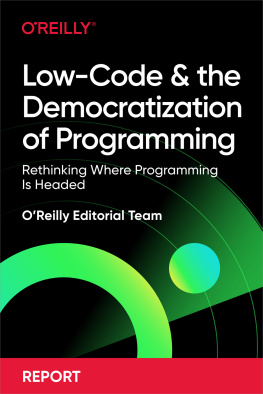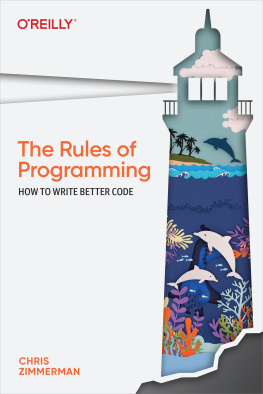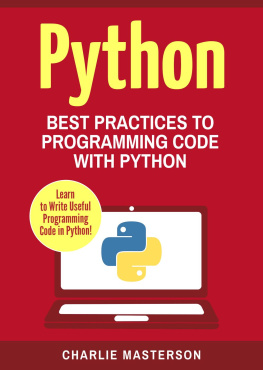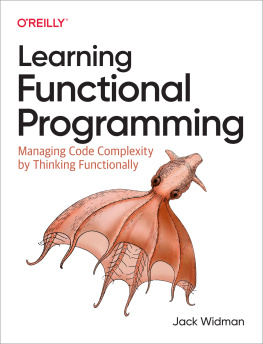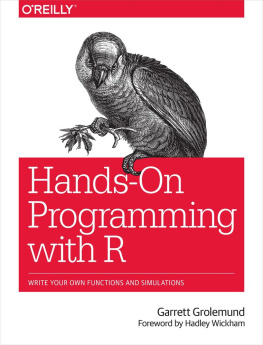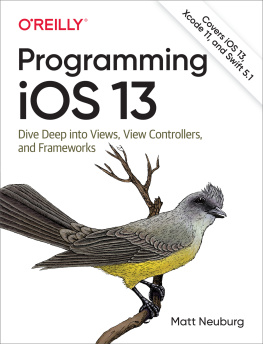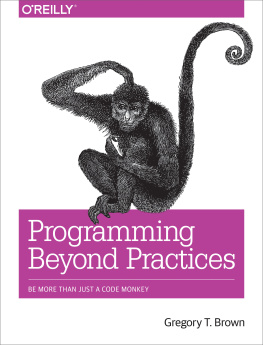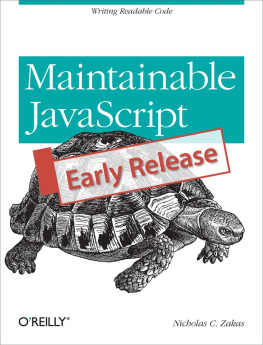OReilly Editorial Team - Low-Code and the Democratization of Programming
Here you can read online OReilly Editorial Team - Low-Code and the Democratization of Programming full text of the book (entire story) in english for free. Download pdf and epub, get meaning, cover and reviews about this ebook. year: 2021, publisher: OReilly Media, Inc., genre: Politics. Description of the work, (preface) as well as reviews are available. Best literature library LitArk.com created for fans of good reading and offers a wide selection of genres:
Romance novel
Science fiction
Adventure
Detective
Science
History
Home and family
Prose
Art
Politics
Computer
Non-fiction
Religion
Business
Children
Humor
Choose a favorite category and find really read worthwhile books. Enjoy immersion in the world of imagination, feel the emotions of the characters or learn something new for yourself, make an fascinating discovery.
- Book:Low-Code and the Democratization of Programming
- Author:
- Publisher:OReilly Media, Inc.
- Genre:
- Year:2021
- Rating:3 / 5
- Favourites:Add to favourites
- Your mark:
- 60
- 1
- 2
- 3
- 4
- 5
Low-Code and the Democratization of Programming: summary, description and annotation
We offer to read an annotation, description, summary or preface (depends on what the author of the book "Low-Code and the Democratization of Programming" wrote himself). If you haven't found the necessary information about the book — write in the comments, we will try to find it.
Low-Code and the Democratization of Programming — read online for free the complete book (whole text) full work
Below is the text of the book, divided by pages. System saving the place of the last page read, allows you to conveniently read the book "Low-Code and the Democratization of Programming" online for free, without having to search again every time where you left off. Put a bookmark, and you can go to the page where you finished reading at any time.
Font size:
Interval:
Bookmark:

by the OReilly Editorial Team
Copyright 2021 OReilly Media. All rights reserved.
Printed in the United States of America.
Published by OReilly Media, Inc. , 1005 Gravenstein Highway North, Sebastopol, CA 95472.
OReilly books may be purchased for educational, business, or sales promotional use. Online editions are also available for most titles (http://oreilly.com). For more information, contact our corporate/institutional sales department: 800-998-9938 or corporate@oreilly.com .
- Acquisitions Editor: Suzanne McQuade
- Development Editor: Virginia Wilson
- Production Editor: Kristen Brown
- Interior Designer: David Futato
- Cover Designer: Karen Montgomery
- Illustrator: Kate Dullea
- August 2021: First Edition
- 2021-08-06: First Release
The OReilly logo is a registered trademark of OReilly Media, Inc. Low-Code and the Democratization of Programming, the cover image, and related trade dress are trademarks of OReilly Media, Inc.
The views expressed in this work are those of the authors, and do not represent the publishers views. While the publisher and the authors have used good faith efforts to ensure that the information and instructions contained in this work are accurate, the publisher and the authors disclaim all responsibility for errors or omissions, including without limitation responsibility for damages resulting from the use of or reliance on this work. Use of the information and instructions contained in this work is at your own risk. If any code samples or other technology this work contains or describes is subject to open source licenses or the intellectual property rights of others, it is your responsibility to ensure that your use thereof complies with such licenses and/or rights.
978-1-098-11258-5
[LSI]
In the past decade, the growth in low-code and no-code solutionspromising that anyone can create simple computer programs using templateshas become a multi-billion dollar industry that touches everything from data and business analytics to application building and automation. As more companies look to integrate low-code and no-code solutions into their digital transformation plan, the question emerges again and again: what will happen to programming?
Programmers know their jobs wont disappear with a broadscale low-code takeover (even low-code is built on code), but undeniably their roles as programmers will shift as more companies adopt low-code solutions. This report is for programmers and software development teams looking to navigate that shift and understand how low-code and no-code solutions will shape their approach to code and coding. It will be fundamental for anyone working in software developmentand, indeed, anyone working in any business that is poised to become a digital businessto understand what low-code means, how it will transform their roles, what kinds of issues it creates, why it wont work for everything, and what new kinds of programmers and programming will emerge as a result.
Low-code: what does it even mean? Low-code sounds simple: less is more, right? But were not talking about modern architecture; were talking about telling a computer how to achieve some result. In that context, low-code quickly becomes a complex topic.
One way of looking at low-code starts with the spreadsheet, which has a pre-history that goes back to the 1960sand, if we consider paper, even earlier. Its a different, non-procedural, non-algorithmic approach to doing computation that has been wildly successful: is there anyone in finance who cant use Excel? Excel has become table stakes. And spreadsheets have enabled a whole generation of businesspeople to use computers effectivelymost of whom have never used any other programming language, and wouldnt have wanted to learn a more formal programming language. So we could think about low-code as tools similar to Excel, tools that enable people to use computers effectively without learning a formal programming language.
Another way of looking at low-code is to take an even bigger step back, and look at the history of programming from the start. Python is low-code relative to C++; C and FORTRAN are low-code relative to assembler; assembler is low-code relative to machine language and toggling switches to insert binary instructions directly into the computers memory. In this sense, the history of programming is the history of low-code. Its a history of democratization and reducing barriers to entry. (Although, in an ironic and unfortunate twist, many of the people who spent their careers plugging in patch cords, toggling in binary, and doing math on mechanical calculators were women, who were later forced out of the industry as those jobs became professional. Democratization is relative.) It may be surprising to say that Python is a low-code language, but it takes less work to accomplish something in Python than in C; rather than building everything from scratch, youre relying on millions of lines of code in the Python runtime environment and its libraries.
In taking this bigger-picture, language-based approach to understanding low-code, we also have to take into account what the low-code language is being used for. Languages like Java and C++ are intended for large projects involving collaboration between teams of programmers. These are projects that can take years to develop, and run to millions of lines of code. A language like bash or Perl is designed for short programs that connect other utilities; bash and Perl scripts typically have a single author, and are frequently only a few lines long. (Perl is legendary for inscrutable one-liners.) Python is in the middle. Its not great for large programs (though it has certainly been used for them); its sweet spot is programs that are a few hundred lines long. That position between big code and minimal code probably has a lot to do with its success. A successor to Python might require less code (and be a lower code language, if thats meaningful); it would almost certainly have to do something better. For example, R (a domain-specific language for stats) may be a better language for doing heavy duty statistics, and weve been told many times that its easier to learn if you think like a statistician. But thats where the trade-off becomes apparent. Although R has a web framework that allows you to build data-driven dashboards, you wouldnt use R to build an e-commerce or an automated customer service agent; those are tasks for which Python is well suited.
Is it completely out of bounds to say that Python is a low-code language? Perhaps; but it certainly requires much less coding than the languages of the 1960s and 70s. Like Excel, though not as successfully, Python has made it possible for people to work with computers who would never have learned C or C++. (The same claim could probably be made for BASIC, and certainly for Visual Basic.)
But this makes it possible for us to talk about an even more outlandish meaning of low-code. Configuration files for large computational systems, such as Kubernetes, can be extremely complex. But configuring a tool is almost always simpler than writing the tool yourself. Kelsey Hightower said that Kubernetes is the sum of all the bash scripts and best practices that most system administrators would cobble together over time; its just that many years of experience have taught us the limitations of endless scripting. Replacing a huge and tangled web of scripts with a few configuration files certainly sounds like low-code. (You could object that Kubernetes configuration language isnt Turing complete, so its not a programming language. Be that way.) It enables operations staff who couldnt write Kubernetes from scratch, regardless of the language, to create configurations that manage very complicated distributed systems in production. Whats the ratioa few hundred lines of Kubernetes configuration, compared to a million lines of Go, the language Kubernetes was written in? Is that low-code? Configuration languages are rarely simple, but theyre always simpler than writing the program youre configuring.
Font size:
Interval:
Bookmark:
Similar books «Low-Code and the Democratization of Programming»
Look at similar books to Low-Code and the Democratization of Programming. We have selected literature similar in name and meaning in the hope of providing readers with more options to find new, interesting, not yet read works.
Discussion, reviews of the book Low-Code and the Democratization of Programming and just readers' own opinions. Leave your comments, write what you think about the work, its meaning or the main characters. Specify what exactly you liked and what you didn't like, and why you think so.

